
What do birds eat?And What Not To Feed Wild Birds
Birds eat a wide variety of food depending on their species and may switch their primary food diet seasonally.
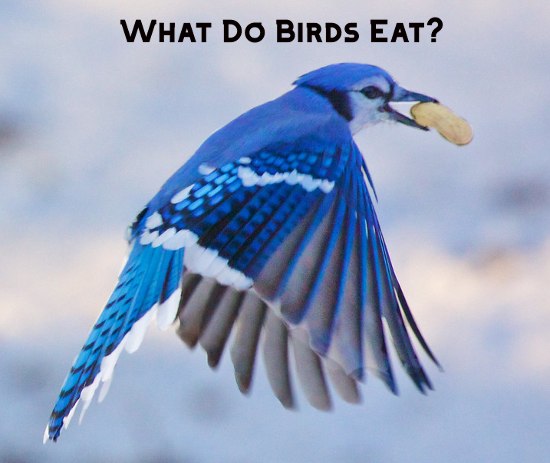
Birds eat seeds, fruit, nuts, suet, fish, insects, carrion, mammals, reptiles, amphibians, and even other birds!
Below are lists of birds according to what they primarily eat.
Is it okay to feed birds:
- Rice (cooked and/or uncooked)?
- Bread?
- Raisins?
- Oats?
What do baby birds eat?
More on those questions a little later...
Birds That Eat Seeds
Many species of birds eat seeds including common backyard birds such as:
- Goldfinches
- Cardinals
- Chickadees
- Sparrows
- Doves
- Jays
Seeds contains fats, protein, carbohydrates, fiber, vitamins, and minerals which provide a high source of energy for the birds.
Some birds have strong seed-cracking beaks, such as grosbeaks, for opening large seeds with tough shells.
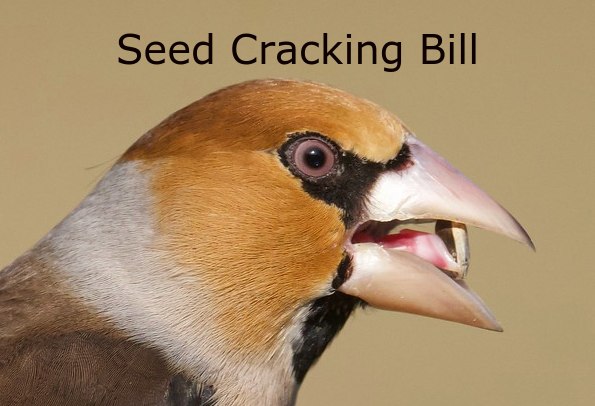
When choosing a bird seed, avoid wild bird mixes that contain a lot of filler seed like milo (sorghum) and wheat.
While these seeds mixes are typically cheaper, in the long run they may actually be more expensive.
Why?
Because a lot of birds will avoid eating those filler seeds, kicking it out of your feeders, and subsequently a lot of the bird seed will be wasted.
Seeds that birds prefer include sunflower, safflower, thistle, millet, and cracked corn.
For more tips, go to this page about attracting birds with the correct bird seed for your feeders.
How To Choose Bird Seed
| Black Oil Sunflower Seeds | Bird Suet Recipes |
| Nyjer Seed | Feeding Birds Fruit |
| Safflower Seed | Corn Bird Food |
| White Proso Millet | Peanut Bird Feeder |
Birds That Eat Fruit
Birds that eat fruit include:
- Orioles
- Tanagers
- Catbirds
- Waxwings
- Thrashers
- Finches
- Robins
- Grosbeaks
- Woodpeckers
- Mockingbirds
- Thrushes
These birds will also eat other foods such as seeds and insects and don't exclusively eat fruit (such as a frugivore), but fruit is part of their diet and provides a quick energy boost from the fructose sugar.
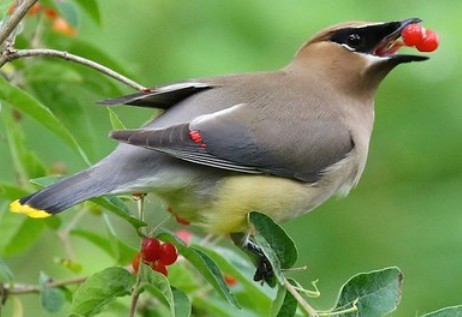
Fruits that birds will eat include berries, apples, peaches, oranges, grapes, figs, and more - everything from pomegranates to persimmons!
Some birds, especially orioles and tanagers, will eat grape jelly if offered at a bird feeder.
Orioles Feeding on Oranges and Jelly
These favorite fruit feeders are designed to hold orange slices and grape jelly.
Birds That Eat Nuts
Birds that eat nuts include:
- Jays
- Woodpeckers
- Nuthatches
- Doves
- Titmice
- Towhees
- Mockingbirds
- Wrens
- Cardinals
Do not feed birds salted, seasoned or coated nuts.
Raw nuts are best.
Roasted nuts are okay as long as they are unsalted.
You can offer nuts that are whole, shelled or in pieces.
Blue Jays Eating Peanuts
Note: Nuts can become rancid as well as get moldy especially in warm, humid, wet weather.
Only put out enough nuts that can be completely consumed by birds in a short period of time (2-4 days), depending on the weather.
If you wouldn't eat nuts that were left out opened for a long time, neither should the birds.
- Peanuts
- Acorns
- Pecans
- Pine nuts
- Hickory nuts
- Almonds
- Walnuts
During winter, nuts help Wrens survive!
A Michigan study determined that supplemental nuts and suet helped Carolina Wrens survive through the winter when it is difficult for them to find food, especially during heavy snowfall.
One peanut alone can provide more than a third of a Carolina Wren's daily metabolic need during the winter!
Reference:
Job, J. and Bednekoff, P. A. (2011), Wrens on the edge: feeders predict Carolina wren Thryothorus ludovicianus abundance at the northern edge of their range. Journal of Avian Biology, 42: 16-21.
Squirrels and Nut Feeders
If you have squirrels in the vicinity of your nut feeders, I'm sure you're aware that they will likely want to feed from your feeders as well.
You can either try to squirrel proof your feeder with a baffle and/or strategic out-of-reach placement, or be willing to feed both birds and squirrels.
Whatever you do, try not to go insane and have squirrel wars every day.
You could also put up a squirrel feeder and offer them their own dining section away from the birds. ;-)
Nuts and namaste. :-)
Birds That Eat Suet
Birds that eat suet include:
- Woodpeckers
- Chickadees
- Jays
- Nuthatches
- Cardinals
- Creepers
- Wrens
If you don't want starlings eating your suet, use upside-down suet feeders where the birds must hang from below in order to feed.
Starlings have weaker toes for hanging upside down vs other birds like woodpeckers, chickadees, etc..
Can suet go rancid?
Suet will go rancid rapidly in warm weather since it is primarily fat as well as make a melted mess...
So either get no-melt suet cakes and only put out enough that will last 2-3 days in hot weather so that the suet doesn't go bad or only offer suet during colder months.
Here are some simple suet recipes you can make at home.
Birds that Eat Nectar
Bird that eat nectar include:
- Hummingbirds
- Orioles
- Tanagers
- Mockingbirds
- Grosbeaks
A simple nectar recipe is a 4:1 ratio of sugar to water.
Fun Fact:
In order for hummingbirds to keep up their energy levels, they must drink nectar at least every 15 minutes.
If they don't have access to a hummingbird feeder, they will have to get nectar from visiting over 1,000 flowers daily!
Birds That Eat Insects, Worms, Larvae
Birds that eat insects, worms, and larvae include:
- Robins
- Swallows
- Flycatchers
- Warblers
- Swifts
- Nighthawks
- Waxwings
- Dippers
- Towhees
- Bluebirds
Gila Woodpeckers, Cactus Wrens, and Curve-billed Thrashers Feasting on Bees
Birds that primarily eat insects, especially flying insects, have specialized feathers called rictal bristles around their bills that make it easier to detect and catch flying insects.
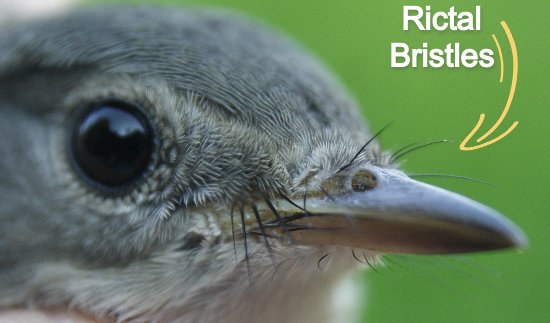
Do hummingbirds eat insects?
Hummingbirds supplement their nectar diet with insects and spiders.
It's not uncommon to see them snatching bugs and the spiders themselves from spun webs.
Birds That Eat Fish
Birds that eat fish include:
- Osprey
- Herons
- Bald Eagles
- Cormorants
- Pelicans
- Penguins
- Kingfishers
- Skimmers
- Loons
- Gannets
- Guillemonts
- Grebes
Birds that exclusively eat fish (piscivores) often have specialized beaks and talons for catching fish.
Osprey have rough scales on their feet with sharp needle-like spicules that help them hold onto the fish after they dive into the water and catch one with their talons.
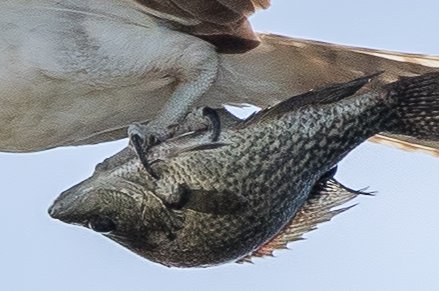
Their talons are even unique from other raptors with the ability to reverse the direction of one of their toes to better catch and hold on to fish.
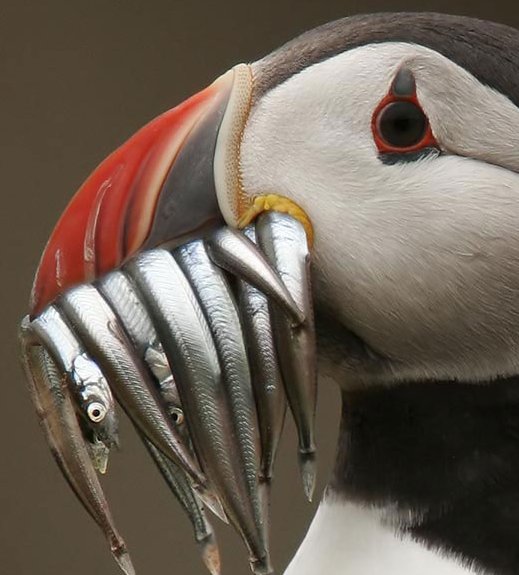
Puffins bills, tongue and palate, with spines and rough textures, are all designed to help hold several slippery fish after they catch them so they don't fall out.
Puffins Holding Multiple Fish in their Bills
A puffin was once seen carrying 62 fish in its bill!
Birds That Eat Birds
Birds that eat birds include:
- Falcons
- Hawks
- Owls
- Eagles
- Crows
- Roadrunners
- Storks
- Egrets
- Herons
- Gulls
Peregrine Falcons will strike their prey (such as a flying bird) starting from soaring heights as high as over 3,0000 feet to stooping speeds of over 200 mph!
Roadrunner catching birds at a fountain. Meep! Meep!
Birds That Eat Carrion
Birds that eat carrion (decaying flesh of animals) include:
- Vultures
- Condors
- Eagles
- Crows/Ravens
- Gulls
- Magpies
- Caracaras
Vultures have special adaptations for eating carrion.
They have bald, featherless heads so that when they stick their heads into a dead animal to reach and eat the rotting flesh, which can carry harmful bacteria, it won't stick to any feathers and possibly give them an infection.
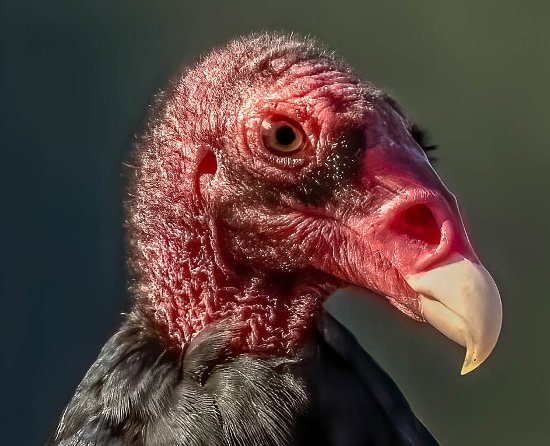
The stomach acid ph of vultures range from 0-1, the lowest of any animal.
That's 100 times more acidic than the stomach ph of humans!
Griffon Vultures and Eurasian Black Vulture Feasting on a Red Deer Carcass
Since vultures are eating decaying flesh that has toxic bacteria and other harmful organisms, they need to have very a very stomach acid ph so it won't get sick and possibly die.
Good thing we have birds and other scavenger animals that will eat carrion and essentially recycle dead carcasses, otherwise there would be a lot more decaying animals lying around and the increased potential for spreading disease.
What do baby birds eat?
Depending on the species, baby birds can be fed anything from a regurgitated mix of insects and seeds to pigeon "milk" (aka crop milk) or captured prey such as fish (ospreys), rodents (owls), small birds (accipiters and falcons).
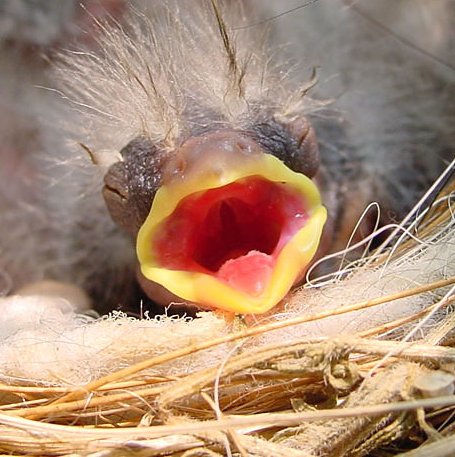
More about caring for baby birds - If you find one or if it is injured, here are some tips on what to do.
What do birds eat in the winter?
Anything they can find, especially food that's high in fat and calories.
They will feed on cached nuts, seeds and berries, dormant insects, carrion, and fish in unfrozen water.
Winter bird feeding - Best seeds, suet, and nuts to offer birds at your feeders during the winter.
Do birds eat rice?
Yes, they do!
Ann Landers (advice columnist) started a myth that a bird's stomach will swell and explode if it eats uncooked rice.
Not true! And she later retracted the misinformation and apologized. Thanks Ann!
She should have watched this video of weaver birds eating uncooked rice from a rice field. ;-)
Birds such as blackbirds, grackles, doves, and sparrows often eat uncooked rice from rice fields.
There may be other reasons why not to throw rice at weddings (it makes a mess for one) , but it's not to prevent the explosion of birds' stomachs.
Do birds eat bread?
Yes. But should they?
There isn't a lot of nutritional value in white bread for birds, and only slightly more for whole grain/wheat breads.
And many store bought breads have a lot of preservatives that birds' stomachs aren't used to and they may upset their digestion and cause diarrhea.
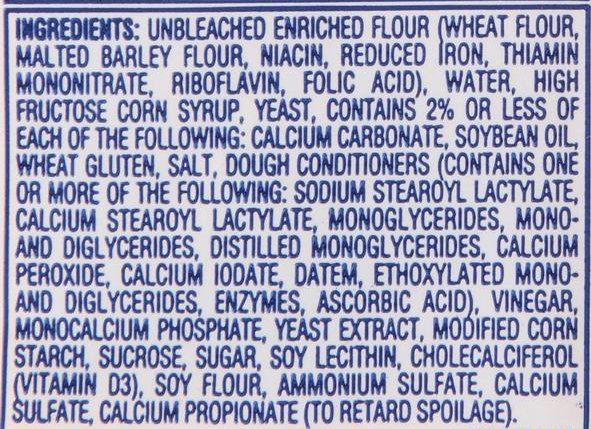
Typical Supermarket Bread Ingredients
Some omnivorous birds, like pigeons, grackles, starlings, and house sparrows, can digest bread better than other birds.
So in small amounts, most birds will be able to eat bread and not have any issues, but it's best not to offer bread at all, especially not to baby birds.
What Not To Feed Wild Birds
These are food items that you shouldn't feed to wild birds:
- Bread
- Processed foods (chips, cookies, any foods high in salt or sugar, etc..)
- Chocolate
- Onions & Garlic
- Honey
- Raw meat
- Salted Nuts & Seeds
- Avocado
It's okay to feed oats, but offer natural oats - not the ones with added sugars and flavorings. Raisins are also okay in moderation - such as mixing them into other bird seed.
Here's more in about what birds eat at Project Feeder Watch.
|
Our Favorite Bird Watching Binoculars, Squirrel-Proof Feeder & Hummingbird Feeder Read Our Reviews: |
||
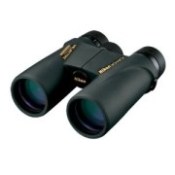
Nikon Monarch M5
Best mid-priced bird watching binoculars. Waterproof, shockproof, multi-coated ED-Glass. |
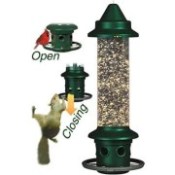
|
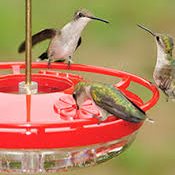
Best Hummingbird Feeder
Drip-Free, Ant-moat, Durable, Easy to Fill and Clean. |
| Click Images or Links To View More Info | ||